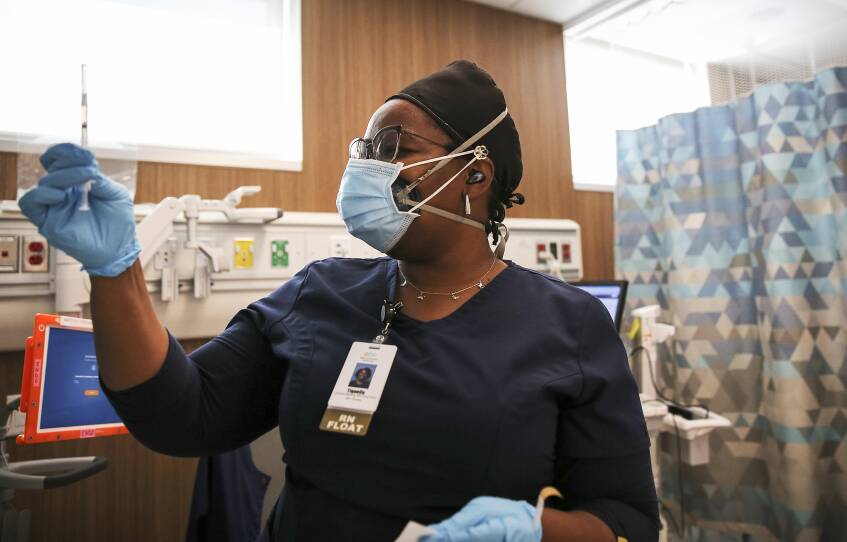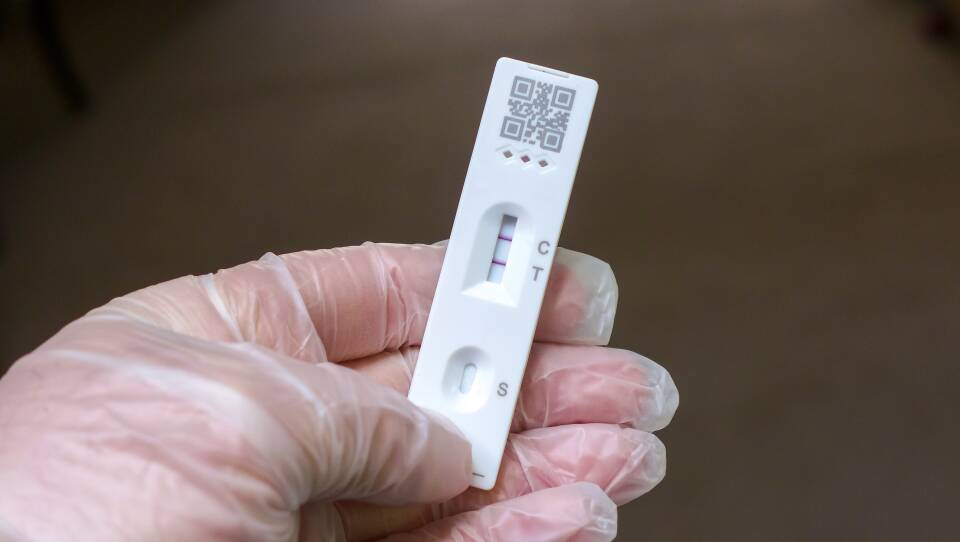More than three years after the COVID-19 crisis prompted federal and state officials to declare public health emergencies, those declarations came to an end today.
With those expirations come notable changes to some policies and practices that have just become part of everyday life — as well as some changes that most people won't notice but that have been central to how government and health officials responded to the pandemic.
Here’s what’s changing, and what isn’t, after May 11.
Masking at medical facilities goes away
The statewide mandate that all health professionals and visitors at hospitals, doctor's offices and other health care facilities expires. They still have the option to require masking, but many major hospital systems have announced that masks will be optional in most circumstances, including at Mass General Brigham, Tufts Medical Center, Boston Medical Center and Beth Israel Lahey Health.
Masks are still required at Dana-Farber Cancer Institute.
"At Dana-Farber, we see many people who have weakened immune systems due to illness or certain types of treatment, and face masks remain an important way to help protect these patients," the hospital said in a statement on its website.
Masks are "optional and encouraged" across most of UMass Memorial Health in Worcester, but the hospital specified in a note to staff last week that it is requiring masks in emergency departments, oncology clinics, and with transplant patients.
The masking requirement was not a national one. Dr. Robert Goldstein, commissioner of the Massachusetts Department of Public Health, said on Tuesday he believes Massachusetts was the last state in the country to require masking at health care facilities.
"Neighboring states have similarly moved away from mandatory universal masking in health care and have pivoted to a strategy based on individual facility level criteria," Goldstein said at a press briefing. "Importantly, as we make this change, we have also asked all health care facilities to develop a proactive plan that uses real-time data to identify when and where COVID-19 prevention strategies should be used, including a return to masking if necessary."
The state's decision to change the hospital masking policy has drawn protest from some activists, who say it puts immunocompromised people and many with disabilities in danger.
“Universal masking has been a life saver for many people with disabilities," said Colin Killick, executive director of the Disability Policy Consortium in a statement. "The fact that hospital mask mandates are being lifted this week ... will once again needlessly endanger the lives of those who are at greater risk because of their disabilities."
Rapid COVID-19 tests no longer covered by insurance
For many, rapid antigen tests became a trusted way to return to something closer to a normal life while making sure not to spread COVID-19 to family and friends. That became especially true since early 2022, when the tests became available from pharmacies with full coverage from insurance companies. As the emergency declaration ends, that mandated insurance coverage becomes a thing of the past.
"People are going to be less likely to think about sniffles or coughs in light of COVID-19, and there will be a further barrier to getting tested because of the cost that these tests might involve," said Dr. Cassandra Pierre, associate hospital epidemiologist and medical director for public health programs at Boston Medical Center. "And it's not a negligible cost."
Rapid antigen tests typically sell for roughly $10 each. Pierre noted the expense of the tests would be hardest for low-income communities who have already been disproportionately impacted by the pandemic.
Goldstein, the state public health commissioner, said this week that the state has a "cache" of rapid tests and can make them available where needed.
"We have over 2.5 million rapid tests available if someone were to need those — any health care facility or community," Goldstein said. "We're going to have to think through how do we make sure that all of the community organizations have the tests that they need, that they had access to previously. They're not going to have the same stream that they had before and the same reimbursement that they had before. But we're working to make sure that everyone who needs a test or wants a test can have a test."
Less frequent data reporting
States are no longer required to share the same level of data related to COVID-19 cases that they've had to for the last three years, including daily reporting of new cases.
Data on new cases had already become increasingly inaccurate as more people self-diagnosed using home tests, and wastewater data has become a more reliable metric for community exposure, Goldstein said. But there are also changes in other reporting requirements.
"We'll see changes in the hospitalization reporting," Goldstein said. "We were previously getting reporting on a daily basis and we'll shift to a weekly basis, which does make sense at this moment in this pandemic and will allow us to continue to stay up to date on what's happening in the hospitals."
The state will also report new vaccinations on a weekly basis, rather than a daily one, he said.
"We're working through all of those changes to make sure that the information that's necessary for communities and for health care settings will continue to be available, accessible, understandable, so that they can make local decisions about what they need to do to protect themselves against COVID," Goldstein said.
But some public health experts say they're concerned the changing data requirements will make it harder to track the virus's spread.
"I do think that we will not have as much information to go on, when and if we decide it's time to pull back or reinstitute some of our former recommendations, for the good of both infection prevention in the hospital and infection prevention in the community," Pierre said.
The reduced reporting requirements will make studies of vaccine effectiveness more difficult, said Andrew Lover, assistant professor of epidemiology at the School of Public Health and Health Sciences at UMass Amherst. That's because negative COVID tests will no longer have to be reported.
"Those studies have been reasonably easy to run through testing sites, but they're going to be a lot more complicated now that the testing will be set up quite differently,” Lover said.
Access to vaccines and therapeutics isn’t changing... yet

For years now, the federal government has bought and distributed doses COVID-19 vaccines and theraputics. The system is transition to a more commercial model, but that process hasn't started quite yet.
"The timeline for commercialization is more towards the fall and winter of this coming year," Goldstein said Tuesday. "And so on May 11th, folks can still go and get a vaccine wherever they were getting a vaccine before. And the cost of that vaccine will still fall to the federal government. So nobody should be limited in their access to vaccines."
But some local boards of health say they're worried about their future ability to continue offering vaccination clinics.
"If we had a clinic tomorrow and I had 500 people show up, I could ask the state for vaccine and receive it," said Tim McDonald, director of Health and Human Services for the town of Needham.
That's because the state has a stockpile of vaccines, McDonald said.
"That is there until it's gone," he said. "And the state projects [its supply] will last into September, potentially October. The state isn't getting any more for free from CDC. Once the state stops getting more for free from CDC, it doesn't give local [boards of health] any more for free. And locals have to then enter the commercial marketplace just like a CVS or a Walgreens, and try to purchase it at quite an expensive cost."
The cost of those vaccines would be reimbursed by insurance coverage, but getting the doses would require a significant up-front expense for local boards of health.
"They'll get the money back. It'll come back, you know, nine to 12 months later, in insurance reimbursements," McDonald said, adding many cities and towns don't have the funds to foot that bill up front.
Non-clinical spaces can still be used for testing and vaccines
During the pandemic, the state allowed hospitals to use non-clinical spaces for uses like testing, vaccination and other services related to the pandemic. Boston Medical Center, for example, set up a testing facility in a former restaurant.
"And it was a godsend to be able to do that, because otherwise it would have been open-air tents, which would not have worked in the fall and winter," said Dr. Pierre.
It was set to revert on May 11, but the state chose to extend the exemption.
Ongoing expanded access to opioid disorder treatment
During the pandemic, the federal government loosened restrictions around the prescription of buprenorphine — commonly known by its commercial name, Suboxone — which is used to treat opioid use disorder and help prevent overdoses. Previously, doctors were required to see patients in-person before prescribing the drug, but a pandemic rule change allowed them to prescribe it following a telehealth visit.
That option was set to expire with the emergency declaration, but the U.S. Drug Enforcement Agency has put that change on hold.
"They got more than 30,000 comments in response to that proposed rule change," said Dr. Miriam Komaromy, medical director of the Grayken Center for Addiction at Boston Medical Center. "So they're processing all of that, and they said we're going to take a pause and we're going to get back to you once we've thought this all through."
Komaromy said she regularly prescribes the drug, and the ability to do so by telehealth appointments is especially helpful for patients admitted to treatment centers that they can't easily leave.
"This is a life-saving drug," Komaromy said. "There's tons of evidence that this medication decreases risk of HIV, of hepatitis, of going to jail, helps people get back to work, helps prolong life, helps prevent overdoses. So super critical medication for people to have access to when they have opioid use disorder. So,we want to take away barriers to this medication and help people to have access to treatment."








